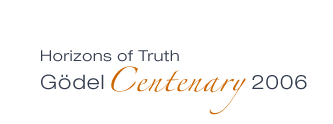|
 |
Angus J. MacIntyre: How much has mathematics been affected by Gödel's work?
Abstract
Gödel's dramatic work seems to have affected mathematics (beyond logic) very little. In particular, it fits badly with the geometrical ideas widespread in contemporary mathematics. Of course, in set theory his influence has been profound, and thanks to him and Cohen, and many very gifted followers, one knows wonderful things about models of ZF. But this has not led to organic connections to other parts of mathematics, and indeed set theory is remote from the centre of mathematics.In number theory and geometry, no one has ever detected a hint of the Incompleteness Phenomena around problems perceived by practitioners as central or natural. What we now know about unprovability of consistency, undecidability, or the effect of large cardinals on the unsolvability of diophantine equations,has neither induced paralysis or anxiety in mathematicians, nor a rush to understand the fine detail of large cardinals.
Technical ideas of Gödel (outside set theory) remain useful, for example around functional interpretations (relevant to the unwinding of proofs in the area where number theory meets ergodic theory and hard analysis). Refinements of his use of the Chinese Remainder Theorem were central to the negative solution of Hilbert's 10th problem (though quite new ideas, and probably geometric ones, appear to be needed for the problem for the rationals). Even in the integer case, the result is about situations far removed from foreseeable concerns of number theorists.
Again, in combinatorial group theory one saw first a wave of negative results (a la Gödel) around decidability, then a brilliant twist by Higman to get hold of subgroups of finitely presented groups. But now, these ideas fade, and the geometrical ideas of Gromov dominate. It is to be noted that large parts of mathematics are provably nonGödelian. Notable examples are the "o-minimal" universes, relating to a slogan of Grothendieck about "topologie moderee", where one has enough expressive power to do geometrical things freely, but not so much that one gets dragged into the geometrically irrelevant pathologies of set-theoretic analysis. Tarski's work on real-closed fields provided the first example, and now many other richer ones are known. Gödel's work seems irrelevant here.

